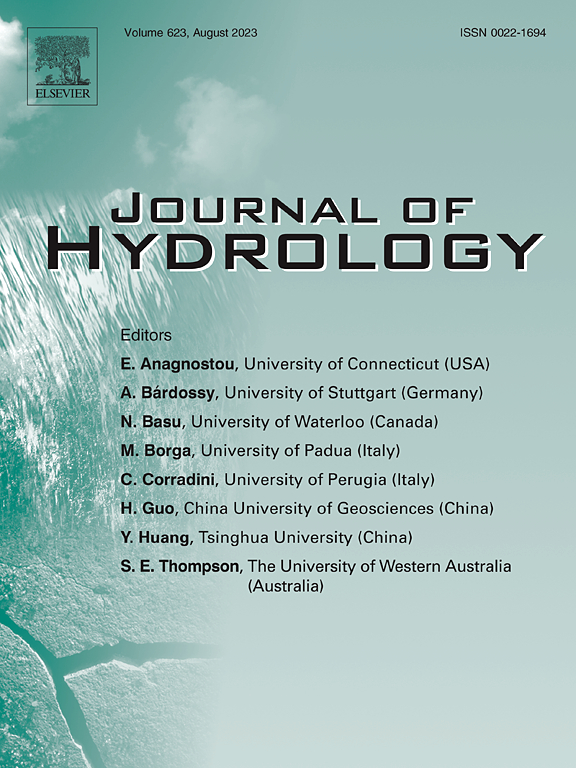A hybrid Capsule-Transformer Network for daily runoff forecasting
IF 6.3
1区 地球科学
Q1 ENGINEERING, CIVIL
引用次数: 0
Abstract
Accurate prediction of daily runoff is crucial for flood prevention and water resource management. However, there exists complex interaction between periodic patterns and sudden fluctuations in hydrological processes. This makes accurate prediction challenging, especially in forecasting extreme events. Current mainstream deep learning methods struggle to simultaneously capture both local temporal dependencies and global temporal correlations. To address this challenge, CTNet (Capsule-Transformer Network) is proposed as a novel hybrid neural network architecture that combines the advantages of time capsule networks and transformers. Specifically, CTNet adopts dynamic routing policy to model different local capsule features, and self-attention mechanisms to learn long-term temporal dependencies, respectively. Furthermore, a cyclic embedding mechanism is proposed to assist in modeling temporal periodicity at different time scales. Extensive experiments was conducted on three datasets: the original Qingxi River basin dataset and two interpolation-enhanced datasets (DI-32 and DI-64). On the original dataset, the mean absolute error (MAE), root mean square error (RMSE), Nash–Sutcliffe efficiency (NSE), correlation coefficient (CC), and Willmott’s index (WI) values of CTNet reached 2.79, 10.65, 0.89, 0.945, and 0.971, respectively. It comprehensively outperforms current state-of-the-art models in both runtime and performance.
用于日径流预测的混合胶囊-变压器网络
日径流量的准确预测对防洪和水资源管理至关重要。然而,水文过程的周期性模式与突发性波动之间存在着复杂的相互作用。这使得准确预测具有挑战性,特别是在预测极端事件时。目前主流的深度学习方法难以同时捕获局部时间依赖性和全局时间相关性。为了解决这一挑战,CTNet (capsule - transformer Network)被提出作为一种新型的混合神经网络架构,它结合了时间胶囊网络和变压器的优点。CTNet分别采用动态路由策略对不同的局部胶囊特征进行建模,采用自关注机制对长期时间依赖性进行学习。此外,提出了一种循环嵌入机制,以帮助在不同时间尺度上模拟时间周期性。在清溪河流域原始数据集和两个插值增强数据集(DI-32和DI-64)上进行了大量实验。在原始数据集上,CTNet的平均绝对误差(MAE)、均方根误差(RMSE)、Nash-Sutcliffe效率(NSE)、相关系数(CC)和Willmott’s index (WI)分别达到2.79、10.65、0.89、0.945和0.971。它在运行时间和性能方面全面优于当前最先进的模型。
本文章由计算机程序翻译,如有差异,请以英文原文为准。
求助全文
约1分钟内获得全文
求助全文
来源期刊

Journal of Hydrology
地学-地球科学综合
CiteScore
11.00
自引率
12.50%
发文量
1309
审稿时长
7.5 months
期刊介绍:
The Journal of Hydrology publishes original research papers and comprehensive reviews in all the subfields of the hydrological sciences including water based management and policy issues that impact on economics and society. These comprise, but are not limited to the physical, chemical, biogeochemical, stochastic and systems aspects of surface and groundwater hydrology, hydrometeorology and hydrogeology. Relevant topics incorporating the insights and methodologies of disciplines such as climatology, water resource systems, hydraulics, agrohydrology, geomorphology, soil science, instrumentation and remote sensing, civil and environmental engineering are included. Social science perspectives on hydrological problems such as resource and ecological economics, environmental sociology, psychology and behavioural science, management and policy analysis are also invited. Multi-and interdisciplinary analyses of hydrological problems are within scope. The science published in the Journal of Hydrology is relevant to catchment scales rather than exclusively to a local scale or site.
 求助内容:
求助内容: 应助结果提醒方式:
应助结果提醒方式:


